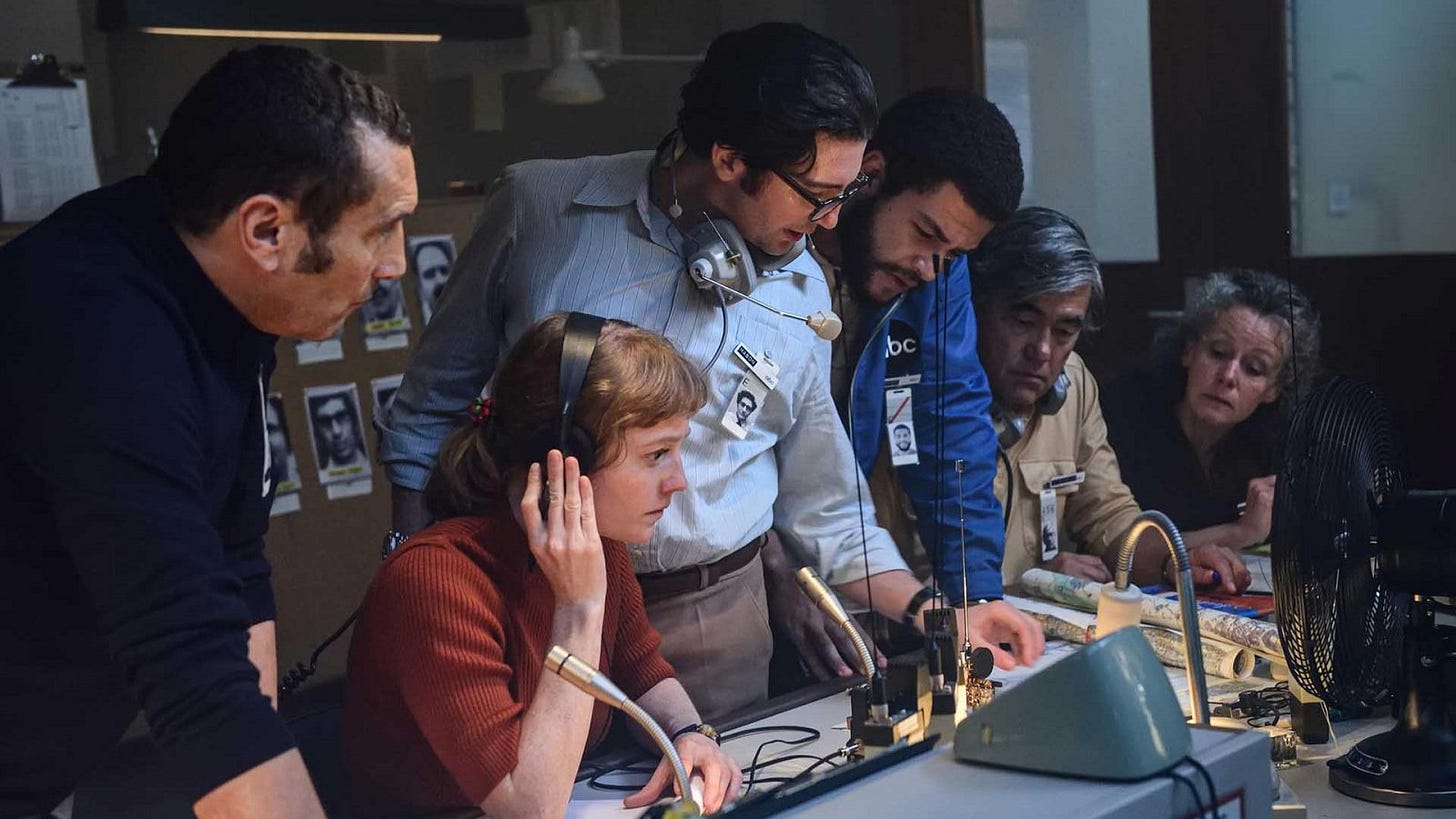In the early hours of September 5, 1972, right in the middle of the Summer Olympics in Munich, Germany, the Israeli team was taken hostage by Black September terrorists. ABC Sports, which was around a hundred yards away from where the attack took place, was initially the only news team able to get live coverage, and September 5 tells that story. This movie has gotten pushed back and pushed back over the last couple of months, and I was glad to see it finally got a release date because it’s a tightly competent piece of work.
When Marvin Bader arrives at ABC in the early morning hours, it seems to be a regular day, but when the crew start hearing gunshots and seeing lights pop on at the nearby Olympic Village, they wonder if something’s wrong. Then a call comes in from Kenneth Moore, confirming their worst fears.
It’s all hands on deck after that, and the ABC team have to figure out how to bring the story to the world in real time, contending not only with equipment and security limitations, but as the situation escalates, they realize their broadcasting may be tipping off the terrorists as to every move of the Munich Police.
Not only that, but they realize the families of the hostages will be watching, and lines have to be walked between accuracy and sensitivity. Is the sight of a hooded terrorist pointing a gun at a hostage the best way to present the event? Should the Black September members even be called “terrorists?”
Even more dicey is ferreting out facts from rumors, and while the German media may be saying one thing, the truth might be completely different. And there’s the temptation to get information out, any information, just to keep from getting scooped.
September 5 has an almost mad rhythm, effectively communicating the gravity of the situation. So many decisions had to be made on the fly. Go to this camera. Cut that one. Get some text on the screen. Rush the raw footage through development and check it before sending it to the Control Room. Listen for communiques from the teletype machines. There were dozens of things happening at once.
The acting in the film reflects that rhythm as well, but it’s so focused and determined that it’s easy to keep track of what’s happening. It helps that the set is so contained, because it gives us a chance to take in everything.
Speaking of everything, the attention to detail in the film is meticulous. The newsroom sets were created based on photos from the time. Almost everything shown on the newsroom monitors is archival footage, and it’s really ingenious the way the film works keeps the transition between movie and archive seamless. The actor who plays sportscaster Jim McKay, for instance, is always filmed from the back and shoulders up. The pool where Mark Spitz won his gold medals is still in use and hasn’t been renovated much, but the crew had to work around the few changes that have been made to shoot a swimming scene there. The actual locations where the attack happened are still used as well, although the Olympic Village was converted to apartments a year after the Olympics wrapped, so it wasn’t possible to film there too extensively.
One of the things we as an audience have to get around is that with all the speed, there’s not much time to get to know the characters. They’re mostly types, although the vast majority are based on real people, and they’re there to serve a purpose. The other thing is that in our post-9-11 world, it’s hard to remember a time when terrorism wasn’t really a known concept. The relative innocence of the ABC Sports crew is almost foreign.
September 5 was definitely worth the wait. It’s an excellent film and a testament to how well ABC presented a grim, scary topic that no one was prepared for.
September 5 is currently in theaters. Rated R.
My grade: A
Principal Cast: Peter Sarsgaard, John Magaro, Ben Chaplin, Leonie Benesch, Zenedine Soualem, Georgina Rich, Corey Johnson, Marcus Rutherford, Daniel Adeosun, Benjamin Walker, Ferdinand Dorfler, Solomon Mousley, Caroline Ebner, Daniel Betts, Leif Eisenberg, Sebastian Jehkul, Rony Herman, Jeff Book.
Directed by Tim Fehlbaum.
Written by Moritz Binder, Tim Fehlbaum, and Alex David.





This could easily be double-billed with Steven Spielberg's "Munich", which deals with the events of the same day from a different perspective.